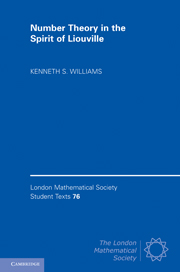Book contents
- Frontmatter
- Contents
- Preface
- Notation
- 1 Joseph Liouville (1809–1882)
- 2 Liouville's Ideas in Number Theory
- 3 The Arithmetic Functions σk(n), σk*(n), dk, m(n) and Fk(n)
- 4 The Equation i2 + jk = n
- 5 An Identity of Liouville
- 6 A Recurrence Relation for σ*(n)
- 7 The Girard-Fermat Theorem
- 8 A Second Identity of Liouville
- 9 Sums of Two, Four and Six Squares
- 10 A Third Identity of Liouville
- 11 Jacobi's Four Squares Formula
- 12 Besge's Formula
- 13 An Identity of Huard, Ou, Spearman and Williams
- 14 Four Elementary Arithmetic Formulae
- 15 Some Twisted Convolution Sums
- 16 Sums of Two, Four, Six and Eight Triangular Numbers
- 17 Sums of integers of the form x2 + xy + y2
- 18 Representations by x2 + y2 + z2 + 2t2, x2 + y2 + 2z2 + 2t2 and x2 + 2y2 + 2z2 + 2t2
- 19 Sums of Eight and Twelve Squares
- 20 Concluding Remarks
- References
- Index
1 - Joseph Liouville (1809–1882)
Published online by Cambridge University Press: 05 May 2013
- Frontmatter
- Contents
- Preface
- Notation
- 1 Joseph Liouville (1809–1882)
- 2 Liouville's Ideas in Number Theory
- 3 The Arithmetic Functions σk(n), σk*(n), dk, m(n) and Fk(n)
- 4 The Equation i2 + jk = n
- 5 An Identity of Liouville
- 6 A Recurrence Relation for σ*(n)
- 7 The Girard-Fermat Theorem
- 8 A Second Identity of Liouville
- 9 Sums of Two, Four and Six Squares
- 10 A Third Identity of Liouville
- 11 Jacobi's Four Squares Formula
- 12 Besge's Formula
- 13 An Identity of Huard, Ou, Spearman and Williams
- 14 Four Elementary Arithmetic Formulae
- 15 Some Twisted Convolution Sums
- 16 Sums of Two, Four, Six and Eight Triangular Numbers
- 17 Sums of integers of the form x2 + xy + y2
- 18 Representations by x2 + y2 + z2 + 2t2, x2 + y2 + 2z2 + 2t2 and x2 + 2y2 + 2z2 + 2t2
- 19 Sums of Eight and Twelve Squares
- 20 Concluding Remarks
- References
- Index
Summary
In 1809, the French mathematician Jean Fourier discovered that a complex wave is the sum of several simple waves; Napoléon Bonaparte was engaged against the British forces in the Peninsular War; and in the little town of Saint Omer, Pas de Calais, France, Joseph Liouville was born on March 24. His father, Claude Joseph, was a captain in Napoléon's army; his mother, Thérèse Balland, was a maternal cousin of Claude's. They came from a distinguished, upper middleclass Lorraine family. The Liouvilles had an impeccable reputation, many of the family serving France honorably in the military, government and the law. The baby Joseph had a brother, Felix, born six years earlier at the family home in Toul, near Nancy.
Because of their father's profession, the family could not always be together and the two Liouville boys spent some of their childhood with an uncle in Vignot, near Commercy, where they attended their first school. Joseph, according to C.-E. Dumont [97], writing in 1843, was no child prodigy. Indeed, his first teacher predicted he would not go far because he played too much. Though this early assessment proved to be very wrong, young Joseph demonstrated his early inclination for mathematics through games, most notably chess.
When Captain Liouville retired the family moved back to Toul. There, Joseph entered the local collège where he studied ancient languages. He continued his studies in mathematics at the Collège St. Louis in Paris and began sketching his own mathematical ideas, transcribing them into notebooks, a practice he maintained throughout his life.
- Type
- Chapter
- Information
- Number Theory in the Spirit of Liouville , pp. 1 - 12Publisher: Cambridge University PressPrint publication year: 2010



